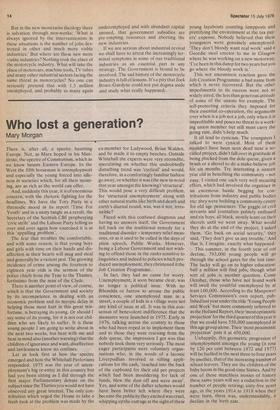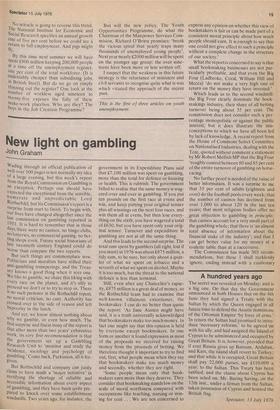Who lost a generation?
Mary Morgan
There is, after all, a spectre haunting Europe. Not, as Marx hoped in his Manifesto, the spectre of Communism, which as we know haunts Eastern Europe. In the West the fifth horseman is unemployment and especially the young forced into idleness in societies which, for all their moaning, are as rich as the world can offer.
And, suddenly this year, it is of enormous concern, with the rhetoric fighting for the headlines. We have the Tory Party in a threnodic mood in its report 'Time For Youth' and in a nasty tangle as a result, the Secretary of the Scottish CBI prophesying 'civic strife' and the Labour Party telling us over and over again how exercised it is at this 'appalling problem'.
The fear that troubles the comfortable, and with some reason, is that young boys and girls with time on their hands and disaffection in their hearts will mug and steal and generally be a violent pest. The growing incidence of crime among the fourteen to eighteen year olds is the sermon of the police chiefs from the Tyne to the Thames, fortissimo from the man of the Clyde.
There is another point of view, of course, which is that the Government and society by its incompetence in dealing with an economic problem and its myopic delay in helping those most hurt in this great misfortune, is betraying its young. Or should I say some of its young, for it is not our children who are likely to suffer. It is these young people I am going to write about in the next two weeks, but bear with me and bear in mind also (another warning) that the children of ignorance and want, disaffection and lawlessness know no confines.
Let us look first at how the spectre emerged and how the Whitehall Pavlovians responded. 1975 was the year of u.nem ployment's big re-entry in this country but had you been sitting as I did through the first major Parliamentary debate on the subject since the Thirties you would not have observed any great interest. The only contribution which urged the House to take a fresh look at the problem was made by the ex-member for Ladywood, Brian Walden, and he made it to empty benches. Outside Whitehall the experts were very recondite, speculating on whether this undoubtedly disturbing trend was 'cyclical' and would, therefore, in a comfortingly familiar fashion go away, or whether it was (the new in-word that year amongst the knowing) 'structural'. This would pose a very difficult problem, for 'structural unemployment' along with other natural truths like birth and death and earth's diurnal round, was, was it not, irresistible?
Faced with this confused diagnosis and having no answers itself, the Government fell back on the traditional remedy for a traditional disorder — temporary relief measures, or as it used to be called in the days of plain speech, Public Works. However, being a Labour Government and not wishing to offend those in the ranks sensitive to linguistics and indeed to policies which produced unemployment, they christened it the Job Creation Programme.
In fact, they had no cause for worry. Unemployment, it soon became clear, was no longer a political issue. With no Rhondda or Jarrow to arouse the public conscience, one unemployed man in a street, a couple of kids in a village were not any kind of issue at all. It was in this consensus of benevolent indifference that the measures were launched in 1975. Early in 1976, talking across the country to those who had been roped in to implement them and to those they were rescuing from the dole queue, the impression I got was that nobody took them very seriously. The most eager participants were voluntary organisations who, in the words of a laconic Liverpudlian involved in sifting applications for the cash, 'reached into the back of the cupboard for their old pet projects which had been mouldering for lack of funds, blew the dust off and were away'. Yes, and some of the clatter schemes would have been better left where they were because the publicity they excited was cruel, whipping up the outrage at the sight of these
young layabouts counting lampposts and prettifying the environment at the tax payers' expense. Nobody believed that these youngsters were genuinely unemployed. 'They don't bloody want real work' said a Geordie steel erector to me in Glasgow where he was working on a new motorway, 'I've been in this dump for two years but you go where the bloody work is.'
This not uncommon reaction gave the Job Creation Programme a bad name from which it never recovered. But the other impedimenta to its success were not so widely aired, the less than generous attitude of some of the unions for example. The self-protecting criteria they imposed for their essential co-operation, the arguments over when is a job not a job, only when it is unprofitable and poses no threat to a working union member but still must carry the going rate, didn'tikelp much.
It all lead to cynicism. The youngsters I talked to were cynical. Most of them wouldn't have been seen dead near a socalled project, didn't fall over in gratitude at being plucked from the dole queue, given a brush or a shovel to do a make-believe job fOr six months. Try interesting a sixteen year old in benefiting the community — not easy. I visited one such very well meaning effort, which had involved the organiser in an enormous hassle begging for contributions from industry and public bodies etc: they were building a community centre for old age pensioners. The gaggle of civil servants and journalists politely enthused and six boys, all black, stonily leant on their shovels until we went away. What would they do at the end of the project, I asked them. 'Go back on social security,' they said, 'They don't give us any trouble.' And that is, I imagine, exactly what happened.
This summer, in the fourth year of our decline, 783,000 young people will go through the school gates for the last time. The lucky will go on to higher education: half a million will find jobs, though what Sort of jobs is another question. Come October, those who have not found work will swell the youthful unemployed by at least 100,000. According to the Manpower Services Commission's own report, published last year under the title 'Young People and Work' but more commonly referred to as the Holland Report, their 'most optimistic projection' for the third quarter of this year is that we could have 350,000 unemployed in this age group alone. Their 'most pessimistic projection' puts it at 450,000.
Unhappily, this geometric progession of unemployment amongst the young (it rose by 120 per cent between 1972 and 1977) will be fuelled in the next three to four years by another, that of the increasing number of school leavers. They are the children of the baby boom in the good-time Sixties. And by one of those matchless ironies of history these same years will see a reduction in the number of people retiring; sixty-five years ago, in the years 1914 to 1918 when they were born, there was, understandably, a decline in the birth rate.
No miracle is going to reverse this trend. The National Institute for Economic and Social Research specifies an annual'growth rate of five per cent before we could sec A return to full employment. And pigs might fly.
By this time next summer we will have Spent £900 million keeping 200,000 people at a time off the unemployment register, one per cent of the total workforce. (It is undeniably cheaper than subsidising jobs In British Steel). But do we go on simply thinning out the register? One look at the number of workless aged nineteen to twenty-five exposes the folly of these rnake-work placebos. Who are they? The boys in the Job Creation Programme? But will the new policy, The Youth Opportunities Programme, do what the Chairman of the Manpower Services Cornmision, Richard O'Brien promises: 'break the vicious spiral that yearly traps many thousands of unemployed young people', Next year nearly £2000 million will be spent on the younger age group: the over nineteens have been more or less written off.
I suspect that the weakness in this future strategy is the reluctance of ministers and civil servants to recognise quite what is was which vitiated the approach of the recent past.
This is the first of three articles on youth unemployment.



































 Previous page
Previous page